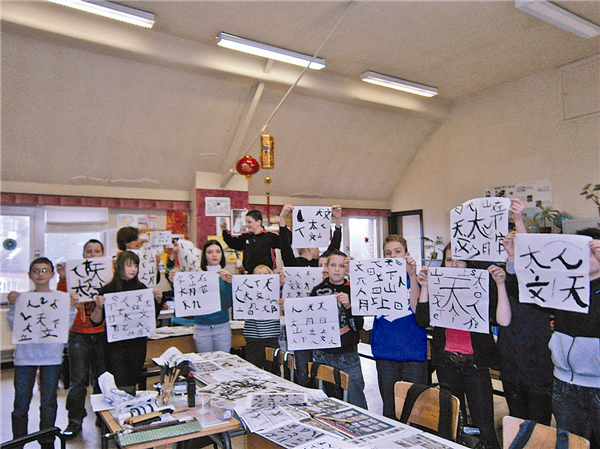Europeans adapt to a new word order
Updated: 2013-03-25 08:07
By Tuo Yannan (China Daily)
|
|||||||||||
 |
|
Harchies Saint Franois primary school students displaying their calligraphy. PROVIDED TO CHINA DAILY |
Growing trend
The Woluwe European School in Brussels is a good example of the growing trend, she said.
It is part of Schola Europaea, or European Schools, an umbrella organization consisting of establishments that offer primary and secondary education and are located across seven countries.
The establishments, controlled jointly by the governments of EU member states, have more than 24,000 pupils, and the European Commission is a member of the board of governors.
The school has forged close links with its counterparts in China over the years, from introducing Chinese study in secondary schools to establishing a student exchange program with the Experimental School in Shanghai.
"I know that this school has very exciting plans to introduce courses in Mandarin and calligraphy, all taught by Chinese teachers," Vassiliou added.
During Chinese New Year, the Mission of the People's Republic of China to the European Union held a celebration at the European School Brussels IV, a plush establishment whose buildings were part of a palace occupied by the Belgian royal family before being donated to the EU last year.
Brussels IV, also a part of Schola Europaea, is one of the group's four schools in Brussels. The majority of students are the children of officials and other EU employees, according to Kari Kivinen, secretary-general of Schola Europaea.
Kivinen said the celebrations for the Chinese New Year have been very influential. Demand was so high that all 800 places were filled in just two days.
"Chinese has been taught in our schools for several years already, because EU policy is to open up further to China, so parents are very keen for their children to learn the language," added Kiniven.
During the Chinese Spring Festival, hundreds of elementary students - many of whom were dressed in traditional Chinese clothing such as Tang suits or qipao - and parents watched a performance of Chinese arts before participating in a range of traditional cultural activities, including making dumplings, the tea ceremony, calligraphy, folk music and tai chi.
Seven-year-old primary school student Louisa said she celebrated Chinese New Year along with her classmates. Her father was extremely keen to accompany his daughter and participate in the celebrations as a way of further encouraging Lousia's interest in the subject.
For Androulla Vassiliou, the increasing demand for Chinese is about looking forward to greater integration, deeper ties and a new direction for Europe.
"The Europe of tomorrow will not be inward-looking, focused on its own habits, languages and cultures. It will be a space increasingly open to exchanges with other peoples, a crossroads of multiple visions and values. I believe I can speak for our Chinese friends when I say that they share our vision of closer future relations based on mutual knowledge, respect and understanding."
Contact the writer attuoyannan@chinadaily.com.cn
Related Stories
Chinese classes in the UK need more teachers 2013-02-08 09:00
Today's Top News
Police continue manhunt for 2nd bombing suspect
H7N9 flu transmission studied
8% growth predicted for Q2
Nuke reactor gets foreign contract
First couple on Time's list of most influential
'Green' awareness levels drop in Beijing
Palace Museum spruces up
Trading channels 'need to broaden'
Hot Topics
Lunar probe , China growth forecasts, Emission rules get tougher, China seen through 'colored lens', International board,
Editor's Picks

|

|

|

|

|

|





